
 Bloomsbury is a registered trademark of Bloomsbury Publishing Plc This electronic edition published in 2016 by Bloomsbury Publishing Plc First published in Great Britain in 2008 by Absolute Press, an imprint of Bloomsbury Publishing Plc Absolute Press Scarborough House 29 James Street West Bath BA1 2BT Phone 44 (0) 1225 316013 Fax 44 (0) 1225 445836 E-mail Website www.absolutepress.co.uk Reprinted 2012, 2013 Text Atul Kochhar, 2008 Photography David Loftus, 2008 Publisher Jon Croft Commissioning Editor Meg Avent Art Director Matt Inwood Editor Jane Middleton Food Styling Atul Kochhar Publishing Assistant Andrea OConnor ISBN 978-1-9045-7383-8
Bloomsbury is a registered trademark of Bloomsbury Publishing Plc This electronic edition published in 2016 by Bloomsbury Publishing Plc First published in Great Britain in 2008 by Absolute Press, an imprint of Bloomsbury Publishing Plc Absolute Press Scarborough House 29 James Street West Bath BA1 2BT Phone 44 (0) 1225 316013 Fax 44 (0) 1225 445836 E-mail Website www.absolutepress.co.uk Reprinted 2012, 2013 Text Atul Kochhar, 2008 Photography David Loftus, 2008 Publisher Jon Croft Commissioning Editor Meg Avent Art Director Matt Inwood Editor Jane Middleton Food Styling Atul Kochhar Publishing Assistant Andrea OConnor ISBN 978-1-9045-7383-8
ePub 978-1-4729-3314-0
ePdf 978-1-4729-3315-7 The rights of Atul Kochhar to be identified as the author of this work have been asserted by him in accordance with the Copyright Designs and Patents Act 1988. All rights reserved
You may not copy, distribute, transmit, reproduce or otherwise make available this publication (or any part of it) in any form, or by any means (including without limitation electronic, digital, optical, mechanical, photocopying, printing, recording or otherwise), without the prior written permission of the publisher. Any person who does any unauthorised act in relation to this publication may be liable to criminal prosecution and civil claims for damages. A catalogue record of this book is available from the British Library. Bloomsbury Publishing Plc 50 Bedford Square, London WC1B 3DP www.bloomsbury.com To find out more about our authors and books visit www.bloomsbury.com. Here you will find extracts, author interviews, details of forthcoming events and the option to sign up for our newsletters.
I WOULD LIKE TO DEDICATE THIS BOOK TO MY FATHER, for being my hero and my guide in the maze of the food world. I lost him earlier this year while writing this book. He was excited about the idea behind the book and wanted so much to see it in print. Thanks to his sense of seasonality and support for local produce, I learned good things under his umbrella. My first few lessons on professional cookery started in his rustic kitchen and proved to be great building blocks in the years to come. I will miss him tremendously in all seasons especially when mangoes are in bloom.
I feel privileged to have been born his son.  Introduction I have often thought that, despite its long coastline, the Indian subcontinent does not make the most of its seafood. Fish tends to be cooked in curries, which mask the qualities that make it special its colours, textures, flavours and aromas. In the UK, too, fish cookery is underexploited. It is a country surrounded by vast oceans, yet we shy away from the wealth of seafood available to us sometimes for free. Although we would all benefit from including fish in our diet more often, many people lack confidence when it comes to buying and cooking fish.
Introduction I have often thought that, despite its long coastline, the Indian subcontinent does not make the most of its seafood. Fish tends to be cooked in curries, which mask the qualities that make it special its colours, textures, flavours and aromas. In the UK, too, fish cookery is underexploited. It is a country surrounded by vast oceans, yet we shy away from the wealth of seafood available to us sometimes for free. Although we would all benefit from including fish in our diet more often, many people lack confidence when it comes to buying and cooking fish.
This book aims to come up with a fresher, simpler approach to fish cookery. It unites Indian spicing and techniques with the best of British seafood and other produce, in dishes such as Kentish Oyster Fritters with Cumin and Chilli-Apple Jelly (). Fish is a wonderfully versatile ingredient and, as long as you take care not to overwhelm it, it makes a perfect canvas for spices and herbs. I have discovered that the marriage of British fish and Indian flavours is one of the best there is. I grew up in East India, where the most inspired Indian fish cookery takes place, amongst communities such as the Bengalis, the Oriyas, the Parsees and the Assamese. My father was extremely proud of his culinary heritage and believed that you should support your local food producers and cook according to the seasons principles that are now accepted culinary wisdom.
When I moved to England, his values came with me, and I immediately started investigating what was available locally. To my delight, I found that I had ended up surrounded by some of the best seafood in the world, from Kentish oysters to scallops from the Isle of Man, from Cromer crab to Scottish herrings. Surrounded by all this bounty, it would be easy to get carried away but I believe we have to be responsible in our approach to fish cookery, avoiding the highly popular but endangered species, such as cod, tuna and eel, while exploring lesser known but more abundant types, like pollack, signal crayfish and grey mullet. Fish farming can create its own problems but occasionally offers a viable alternative. For more information on sustainable fish, have a look at the Marine Conservation Societys website, www.fishonline.org, which rates species according to whether stocks are managed in a sustainable fashion. Indian cooking is often considered complex, and its true that ingredients lists can be very long.
I have tried to ensure that the recipes in this book are simple and accessible particularly in the chapter on Fish for Everyday () to be particularly reliable. Finally, do consider this book as mere guidance, and use your imagination to create new combinations and flavours. Remember, you need to use spices in the same way as salt and pepper in your cooking. Always taste as you go along, and adjust the seasoning as necessary. As you develop your confidence with spices, you will find yourself reaching for your spice box more often. Happy and healthy cooking! ATUL KOCHHAR London, May 2008 Soups & Stews Mussel soup This is one of the easiest soups to make, with the spices adding some dazzling flavours.
Crushed coriander seeds and dried chilli provide a lovely textural contrast to the soft flesh of the mussels. The spicing is inspired by the kadhai cooking of northern India, which uses a base of garlic, red chilli flakes and coriander seeds and then rounds the dish off with garam masala. In the UK, this cooking style is known as balti, a name that mistakenly evolved here for the kadhai, which is a kind of Indian wok. Alternative fish any shellfish SERVES 68 2kg mussels 150ml dry white wine 1 tablespoon vegetable oil 2 garlic cloves, finely chopped teaspoon crushed coriander seeds teaspoon red chilli flakes 1 small onion, finely chopped 2cm piece of fresh ginger, finely chopped teaspoon ground turmeric teaspoon garam masala 450ml Saffron Fish Stock (see ) 150ml double cream juice of lime 1 tablespoon chopped dill or tarragon sea salt and freshly ground black pepper Scrub the mussels under cold running water, pulling out the beards and discarding any open mussels that dont close when tapped on the work surface. Place the mussels in a large pan and pour over the wine. Cover with a tight-fitting lid and cook over a fairly high heat for 5 minutes or so, shaking the pan occasionally, until the shells open.
Strain the mussel cooking liquid through a fine sieve into a clean bowl and set aside. Heat the oil in a large pan, add the garlic, coriander seeds and chilli and saut gently until soft and golden. Add the onion and saut until translucent. Stir in the ginger, turmeric and garam masala, plus the saffron stock and strained mussel cooking liquid, and simmer gently for 10 minutes. Meanwhile, shell the mussels, setting aside about 20 unshelled ones as a garnish. Discard any mussels that havent opened.
Stir the shelled mussels and the cream into the soup, add a squeeze of lime juice and season to taste. Heat through gently, stir in the dill or tarragon, then ladle into bowls. Divide the reserved mussels between the bowls and serve. Citrus langoustine soup JHINGAE KA SHORBA I created this light, delicate soup as an experiment to serve as a pre-starter at Benares. It was so popular that people asked for second helpings. Once you have cooked the langoustines, I recommend using the shells to make the stock (see ).
Next page
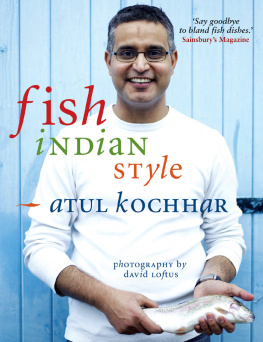

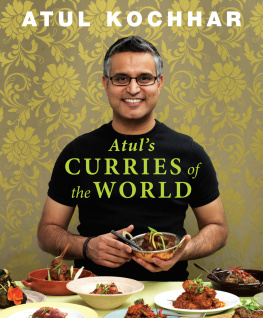
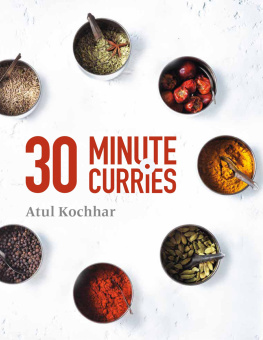
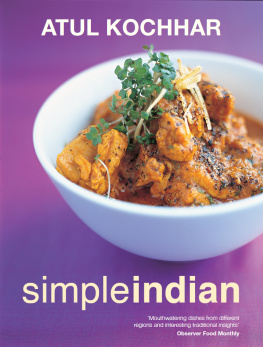
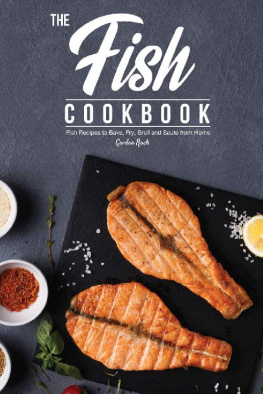

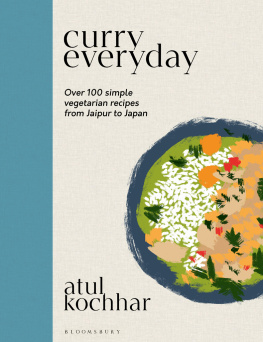
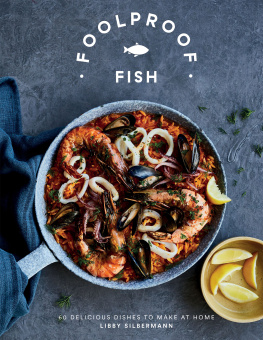
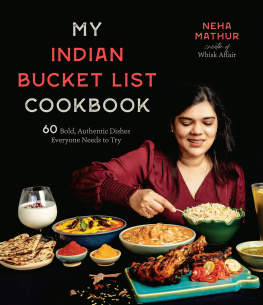
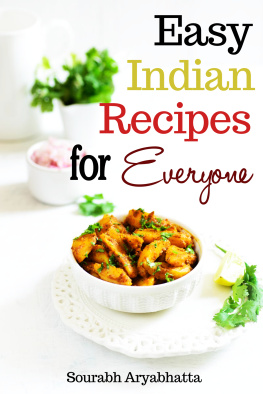
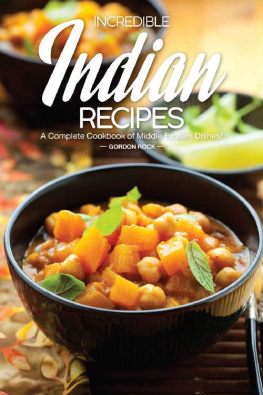

 Bloomsbury is a registered trademark of Bloomsbury Publishing Plc This electronic edition published in 2016 by Bloomsbury Publishing Plc First published in Great Britain in 2008 by Absolute Press, an imprint of Bloomsbury Publishing Plc Absolute Press Scarborough House 29 James Street West Bath BA1 2BT Phone 44 (0) 1225 316013 Fax 44 (0) 1225 445836 E-mail Website www.absolutepress.co.uk Reprinted 2012, 2013 Text Atul Kochhar, 2008 Photography David Loftus, 2008 Publisher Jon Croft Commissioning Editor Meg Avent Art Director Matt Inwood Editor Jane Middleton Food Styling Atul Kochhar Publishing Assistant Andrea OConnor ISBN 978-1-9045-7383-8
Bloomsbury is a registered trademark of Bloomsbury Publishing Plc This electronic edition published in 2016 by Bloomsbury Publishing Plc First published in Great Britain in 2008 by Absolute Press, an imprint of Bloomsbury Publishing Plc Absolute Press Scarborough House 29 James Street West Bath BA1 2BT Phone 44 (0) 1225 316013 Fax 44 (0) 1225 445836 E-mail Website www.absolutepress.co.uk Reprinted 2012, 2013 Text Atul Kochhar, 2008 Photography David Loftus, 2008 Publisher Jon Croft Commissioning Editor Meg Avent Art Director Matt Inwood Editor Jane Middleton Food Styling Atul Kochhar Publishing Assistant Andrea OConnor ISBN 978-1-9045-7383-8 Introduction I have often thought that, despite its long coastline, the Indian subcontinent does not make the most of its seafood. Fish tends to be cooked in curries, which mask the qualities that make it special its colours, textures, flavours and aromas. In the UK, too, fish cookery is underexploited. It is a country surrounded by vast oceans, yet we shy away from the wealth of seafood available to us sometimes for free. Although we would all benefit from including fish in our diet more often, many people lack confidence when it comes to buying and cooking fish.
Introduction I have often thought that, despite its long coastline, the Indian subcontinent does not make the most of its seafood. Fish tends to be cooked in curries, which mask the qualities that make it special its colours, textures, flavours and aromas. In the UK, too, fish cookery is underexploited. It is a country surrounded by vast oceans, yet we shy away from the wealth of seafood available to us sometimes for free. Although we would all benefit from including fish in our diet more often, many people lack confidence when it comes to buying and cooking fish.